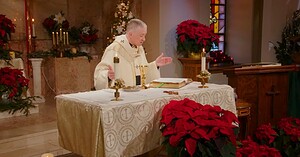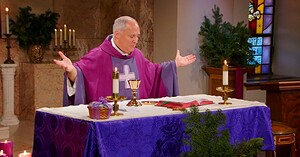Easter Sunday of the Resurrection of the Lord
Homily Video
Easter Sunday of the Resurrection of the Lord Homily Transcript
>>Perhaps it’s because we have celebrated the Feast of Easter so many times and heard the gospel texts that recount the resurrection, we overlook then the fact that there’s something strange about these accounts. For here, we have a claim that Jesus rose from the dead. He came out of the tomb. The stone was rolled away. And he walked out. And yet, there was no sighting of this event. There was no witness to the actual moment in which Jesus rose from the dead and came out of the tomb. That’s quite remarkable! But instead, what we have in this gospel from John today is not that Jesus walks out of the tomb, but that the disciples do. They go in and see what took place and they leave the tomb behind. So, it’s a reminder that our celebration of Easter. While it is a proclamation that Jesus is risen from the dead, it’s also a proclamation about our rising from the dead of coming out of the tomb – of having new life. It’s our story as well. And we have in the texts that are given to us from the Acts of the Apostles and Colossians and this text from John a kind of pattern, by which we can once again claim this resurrection to be our own. I know three things that occurred to me. The first is that early in the morning we hear Mary Immaculate, a disciple of Jesus – who’s also, by the way, called the Apostle to the apostles, because she goes and tells people right away that something’s amiss – she comes early and the first thing she notices is that the stone is rolled away. Some years ago, a pastor was telling me about how in celebrating the season of Lent, he asked people to take a little pebble and carry it in their pocket, their whole, the whole time and to think about the things that irritate them in life. Maybe they could put it in their pocket or even in their shoe. The things that made them out of sorts. That had their life somewhat unbalanced. And then on Palm Sunday, he asked everybody to bring that stone, that little stone, that little rock, back to the church and put it in a big basket. And people were surprised when they came on Easter Day because the wood cross that they had during Lent. Now was covered with all those stones. And his point was, leave the stones there. You also, as you celebrate the resurrection, make sure that you allow those stones, those irritants in your life, the things that have held you back from living the gospel, to be crucified with Christ. What are those stones? Well, those are the obstacles that sometimes people put in our way. Or maybe the stones they throw at us and hold us back from being the people we want. Or maybe ourselves being a stone, being an obstacle, a stumbling block to other people by our easy judgments, our holding our love from them. Our unwillingness to forgive. But also the times in which maybe we have actually thrown stones at people through our gossip. The stone has to be rolled away from the tomb. And it’s an opportunity for us to leave those stones behind. And just as a pastor wanted those stones to be put on the cross, glued on the cross so that they would stay there and people would not take them back in a season of the resurrection. The second aspect that we see is that in order for this resurrection to be proclaimed, Jesus doesn’t just have this for Mary Magdalene, the disciples come together. It’s an awareness that the resurrection has to be about our commitment to build up the community of faith that we worship with. That as part of our archdiocese, as a part of our family life as a church. So often we see divisions in society bleed into the life of the church, where sometimes we allow our political preferences all of a sudden to divide us spiritually from one another. It’s important to remember that the first thing that we say about the church in the four marks about the church is that we are one. That there is unity among us. And we have to, as the Holy Father is saying, and the synodal process that he has begun to make sure we go to the margins and get those who feel excluded. So that they come to the center of who we are. And then make a real intentional effort to make sure that people are not excluded. My mother raised nine children and she was once asked, it was kind of a trick question, “Do you love any of your children more than the rest of them?” And her answer was swift and sure. She said, “Only if they need it.” Only if they need it. And that is the spirit that we should have in this Easter season. Where the Lord is telling us to make sure that those who need it actually have our love. That we don’t take for granted building community, healing divisions. Making sure that people are not excluded, but that we really make an intentional effort to build community. That’s one of the wonderful things here about Mercy Home. Father Scott and all of his collaborators here and all of the benefactors work in a way that not only educate these young people, to give them a future for their own lives, but they’re drawn together to appreciate the fact of being linked to other people. That they don’t live just for themselves. That is, it seems to me, a great witness of the resurrection that’s done here in this wonderful place. And the final thing we notice in the scripture today is in the Acts of the Apostles. We see that those who witness for the Lord claim not only that they saw Jesus, but they ate and drank with him. That’s quite a claim! They ate and drank with the risen Lord. But isn’t that what we claim to be doing when we come to the Eucharist, that a part of our recapturing who we are as a Easter people, a people who rise from the dead, is that we take seriously coming to eat and drink with the Lord. I know that the pandemic has separated us and made people hesitant to come to mass. That surely, I think, has to be respected and we want to make sure that people are safe. But it is time for us as a community to come back and eat and drink with the Lord if we’re going to proclaim the resurrection. If the resurrection is going to have a meaning in all of our lives. I always like to tell the story that a priest, Father Ryan, told about an incident that happened during the second World War when he was a chaplain. They were on a mission of going from one island to the other, these Marines that he was chaplain for and one day they found themselves in an island and they knew the next day was going to be really difficult because there was heavy bombardment. And so, one of the Marines, a Catholic boy who was even thinking about becoming a priest after the war, his name was Jimmy, said to Father Ryan, “Can we have mass tonight before we go into battle.” And so, they did. And Jimmy got everything set up. And the next day, the battle raged. Father Ryan was called to the front after it because some of the Marines were wounded, some killed. And he came across a soldier who was lying down on his stomach and he turned them over and there was young Jimmy. He had a gaping wound in his in his stomach. And he said, “Father Ryan, am I going to make? it as a bad?” “Yes. Jimmy, I won’t lie to you. It’s bad. I don’t think you’re going to make it. Let’s say a prayer for you.” And then he said, Jimmy said something that he’d never forget. “Isn’t it something Father,” he said “that just last night I received Jesus in the Eucharist, and now I’m going to see him.” That is what we believe when we come to the Eucharist, that the same risen lord that we are going to see when we die is the one that we celebrate here. That’s why it’s so important. It nourishes our faith in the resurrection. And become, so that we become these Easter people that we claim to be. So today we don’t have a sighting of Jesus coming out of the tomb. Instead, the sighting is about the disciples coming out of the tomb. It’s an opportunity for us to let the stone be rolled back, whatever that stone may be in our lives, to make a commitment to building community and to see that we don’t live for ourselves. And finally, that we take seriously and treasure eating and drinking with the Lord. Four that links us back to that early community. Who proclaimed, as we do today: Christ is risen. He has truly risen.
Readings
First Reading:
Lk 19:28-40 (37)
Second Reading:
Is 50:4-7
Gospel:
Phil 2:6-11
Featured Text
Discover More
The Nativity of the Lord
December 25, 2025
Fourth Sunday of Advent
December 21, 2025
Third Sunday of Advent
December 14, 2025
Request Sunday Mass Guide
The Sunday Mass Guide sent to your home address
Spiritual nourishment and updates from the Sunday Mass community
Monthly reflections from Fr. Scott Donahue, our Principal Celebrant


